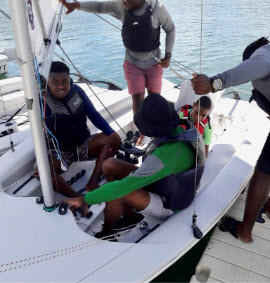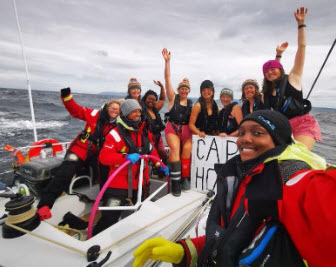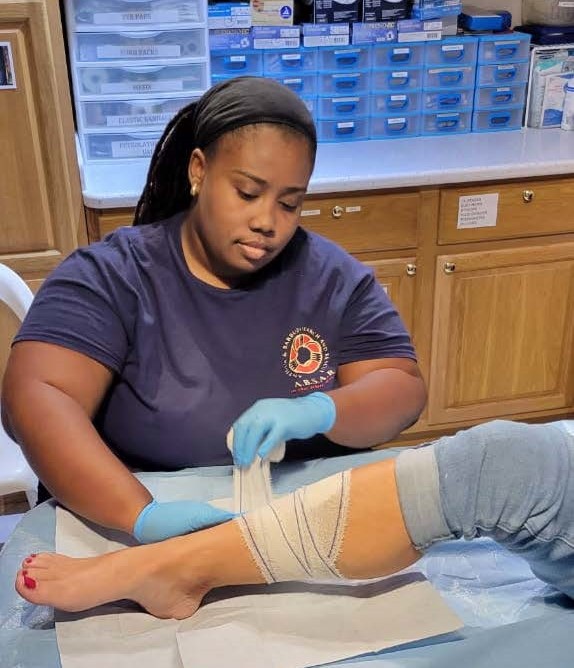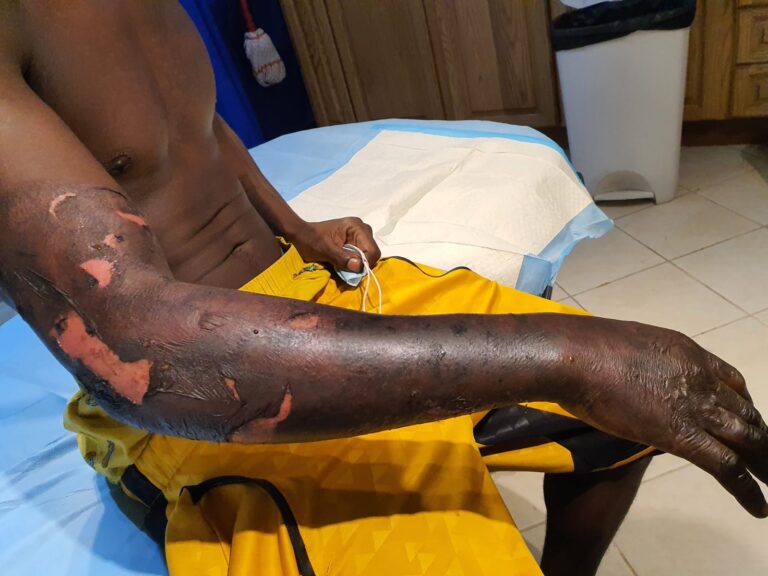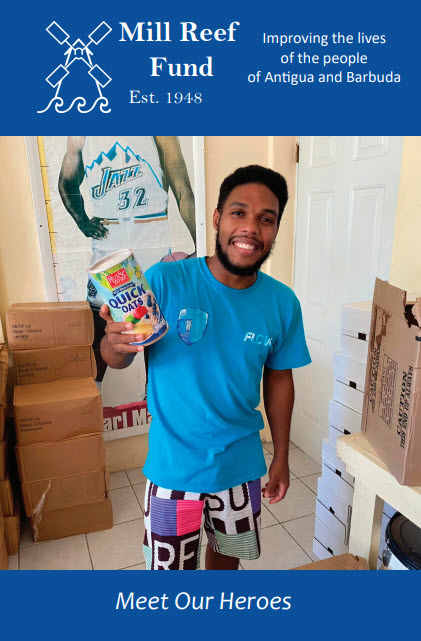Features & Updates
Setting Sail to Success: Antigua’s NSA Launches Alumni Into a World of Excitement, Competition, and Careers
Antigua’s National Sailing Academy (NSA) alumni are making waves in the sailing and marine world, from working as professional boat managers to racing in international sailing competitions.
One alum spent several years on the 58-foot ocean racer Maiden, traversing multiple continents to educate young women about STEM subjects. Another alum is an instructor at the Cayman Islands Sailing Club and a few alumni work as delivery skippers for charter companies.
NSA is currently providing afternoon swimming and sailing classes to students at 15 schools throughout Antigua and Barbuda. Last year, 100 students graduated from their school program, including 50 boys and 50 girls.
“We’ve been encouraging more girls and women to try sailing because it’s a very accessible sport and career option, whatever your gender or age,” says Alison Sly-Adams, NSA general manager.
NSA’s free sailability program expands the horizons of special-needs children and adults
In 2014, the National Sailing Academy began offering differently-abled Antiguans and Barbudans a chance to experience sailing to the best of their abilities.
“Our sailability students have a wide variety of physical and intellectual challenges, and each person’s needs are unique,” says Sly-Adams. “Students who have limited or no mobility enjoy the adventure of being a passenger on a sailboat. Other students may ultimately be able to sail independently and even race.”
Sailability classes are offered five days a week throughout the year, and institutions currently participating in the program include Friends of the Care Project, Adele School, Victory Centre, and the National Rehabilitation Centre.
Dreams of marine-related careers become reality under NSA’s tutelage
NSA began offering a Royal Yacht Association (RYA) certification program in 2013, a certification that opens doors to careers worldwide.
“Last summer we held an Intensive Summer Camp Training to help young people earn their RYA Levels 1 to 3, and a generous donor made it possible for us to provide scholarships to six Antiguan students,” says Sly-Adams. “We hope to be able to offer the program again next summer.”
Sly-Adams says NSA is eager to partner with additional organizations and schools to get more Antiguans and Barbudans out on the water, enjoying sailing as recreation and opening their eyes to potential careers in the marine industry.
“Sailing is great fun, and—as many of our students and alumni are demonstrating—it can lead to exciting and profitable employment and adventures anywhere in the world,” she says.
Rotary Clubs Kickstart 2024 With Generous Gifts to
Island Schools and Sewing Centers
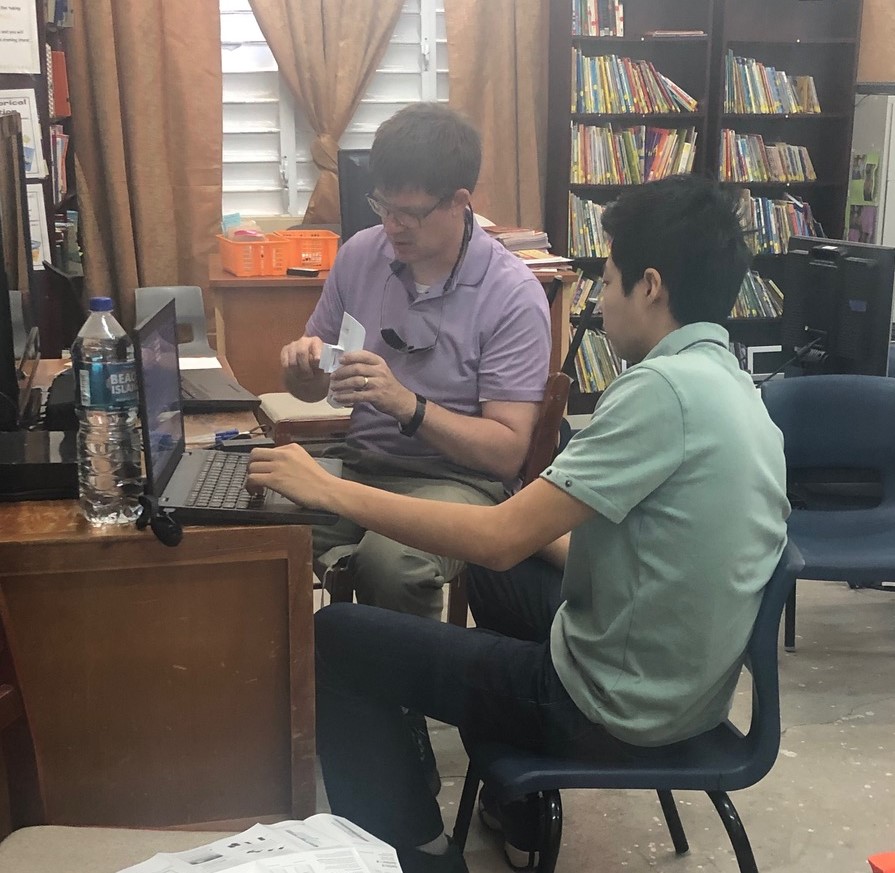
BBRC students working together
Antiguan and Barbudan schoolchildren and seamstresses will reap the benefits of Rotarians’ generosity in February when the Bellevue Breakfast Rotary Club (BBRC) arrives from Washington state to deliver about 1,500 laptops to more than 40 island schools. They’ll also open a new sewing center on the island. The visit is scheduled for February 17-28 and the Mill Reef Fund (MRF) is a major supporter of the program.
Computers and Wi-Fi donations have transformed learning in island schools
“BBRC started bringing computers to Antiguan and Barbudan schools, and building fully networked computer labs, in 2008,” says John Martinka, BBRC member and project leader. “In the early years, all the computers were tied to a computer lab, but now we bring laptops and network entire schools for Wi-Fi.
”This year marks BBRC’s 15th visit to the island, and as of February the club will have donated about 8,000 computers.
“Before BBRC started coming to Antigua and Barbuda there were no computers or Wi-Fi in the schools except for technology used by management and staff,” says Cordel Josiah, a member and past president of the Rotary Club of Antigua and the longtime local coordinator of the Rotarians’ computer and sewing center programs.
“The donated computers and Wi-Fi networks have significantly enriched education in Antigua and Barbuda, and principals and teachers frequently express their gratitude and appreciation for the way the technology has expanded their teaching opportunities and increased students’ eagerness to learn,” says Josiah.
The laptops BBRC delivers to Antiguan and Barbudan schools are prepped by high school students who are taking computer networking classes in Bellevue, Washington.
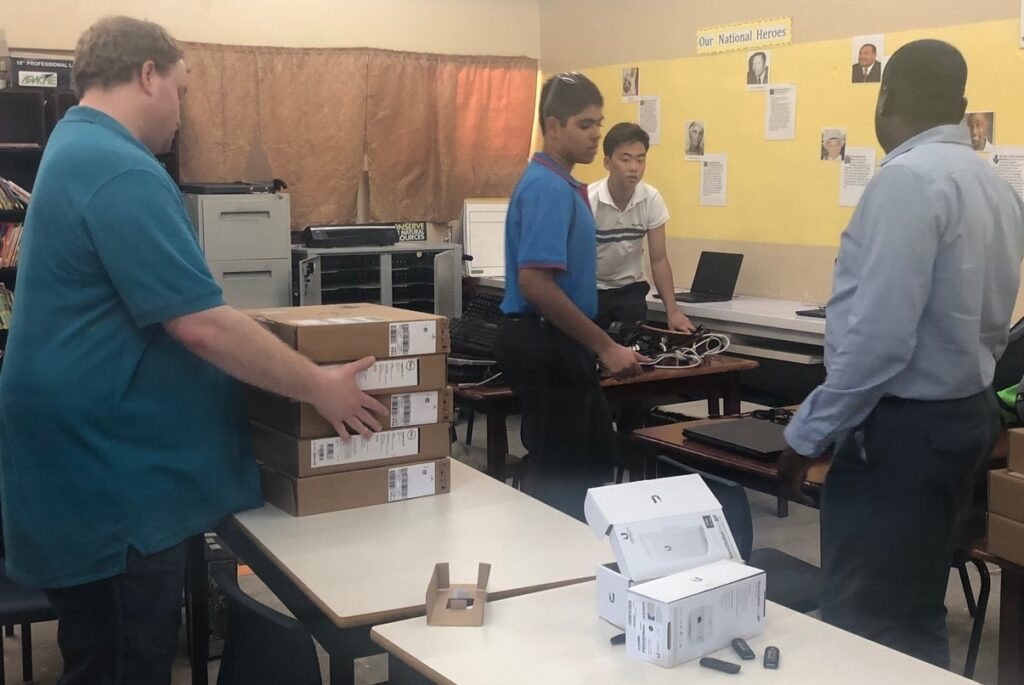
BBRC Work begins on computers
“Students make sure all the computers are in good working order, and about 15 students are accompanying us to Antigua in February to help set up the computers and Wi-Fi services, assisted by Antiguan and Barbudan students,” says Martinka. The Bellevue students will be hosted by local families while they’re visiting the island.
“Our school’s reading program has been greatly enhanced by Bellevue Breakfast Rotary Club’s donations and the Mill Reef Fund’s support,” says
Denmore Roberts, principal of T.N. Kirnon Primary School in Saint John’s. “We are eternally grateful for these partnerships and hope they continue
long into the future.”
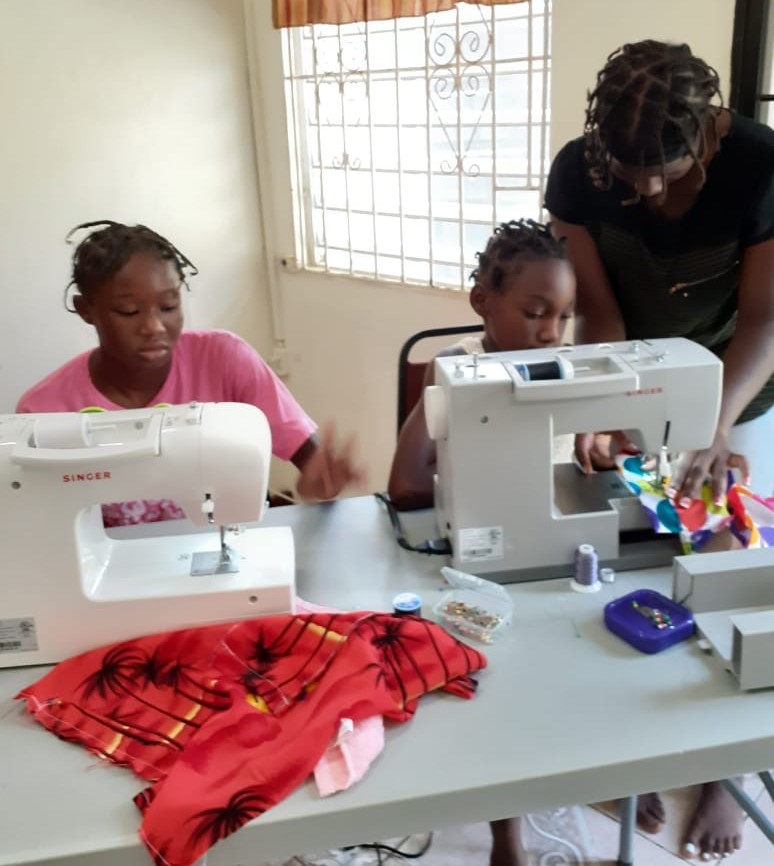
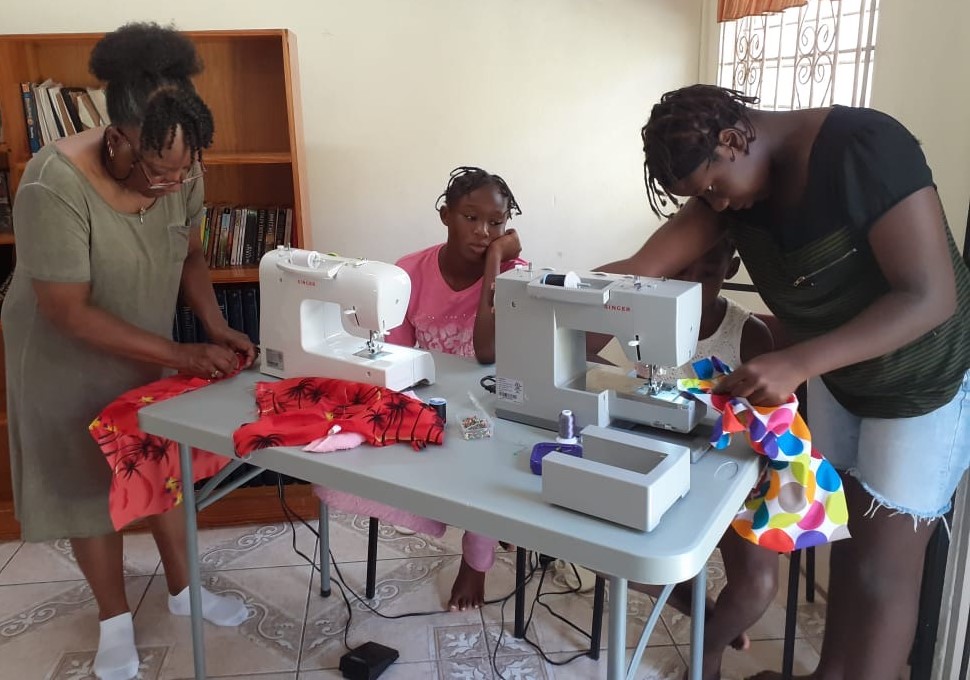
Sewing centers help women develop marketable skills and confidence
Rotarians expanded their philanthropic scope beyond computers in 2009 when they began opening sewing centers throughout Antigua and Barbuda. They will open the 11th center in February and deliver supplies to the 10 sewing centers they’ve already established.
“Classes at the sewing centers teach women basic sewing skills so they can sew for their families as a cost-cutting measure, donate handmade clothes to people in need, and even start their own small businesses, selling the items they make,” says Jan Martinka, a Rotary Club of Kirkland Downtown member in Washington state who spearheads the effort with invaluable local assistance from Josiah.
“Students in the classes learn to use sewing machines, cut fabric, and make simple items like cloth bags, pillowcases, and napkins,” says Josiah.“ As they progress, they learn to make dresses, pants, aprons, and skirts, and they’re able to teach other women to sew. Over the past 14 years the sewing centers have improved the lives of more than 600 budding seamstresses.”
Rotarian-inspired sewing centers are currently located in Cedar Grove, Freetown, Greenbay, Jennings, Liberta, New Winthorpes, Potters, Saint John’s, Villa and Point, and Willikies.
Come meet the Rotarians and see philanthropy in action
If you’re interested in meeting members of the BBRC contingent and seeing them at work in February, watch MRF’s website for a schedule of their itinerary. “We’d love to meet any Mill Reef Club members and guests who are interested in dropping by for a visit,” says John Martinka.
From Flames to Recovery: How ABSAR's Lifesaving Care Shines in Antigua
“I didn’t know the flames were going to go so high! My face, my hair, my arms, my clothes, everything was on fire,” says Antigua resident Errol, remembering the day in September 2020 when an unexpected gasoline fire suddenly set him ablaze.
Luckily, he was with a friend who was able to put out the fire and rush him to the Antigua & Barbuda Search and Rescue (ABSAR) Medic Station, where staff and volunteers are on call to treat medical emergencies.
“Errol came to our office with severe burns to an estimated 10% of his body and received immediate care from our ABSAR medics,” says Karen Mothersill, ABSAR’s administrative coordinator. “One of those medics was our employee, Kiana Luciano, an Advanced-EMT who is known in the English Harbour area as being a miracle worker with burns and wound care.”
Errol certainly thinks Mrs. Luciano and ABSAR are miracle workers.
Mrs. Luciano says ABSAR provided Errol with sometimes daily wound cleaning and dressing changes for 16 days until he no longer required medical oversight and could easily care for the healed burns on his own. He was advised to limit direct sun exposure to the affected areas and apply vitamin E oil for up to several weeks after his final dressing change.
“His entire treatment was free of charge, but his family kindly donated what they were able and gifted me a lovely bag of fresh lemon grass,” says Mrs. Luciano.
The ABSAR Medic Station is located at the Antigua Yacht Club Marina Resort, where it provides walk-in treatment for a variety of minor injuries and illnesses and works in cooperation with many doctors on the island. The nonprofit organization is also an officially recognized search and rescue service in Antigua and Barbuda and provides marine search and rescue, marine firefighting, community emergency medical response, and on-the-water support of local regattas, swimming, and boating events.
The Mill Reef Fund is a longtime supporter of ABSAR, funding vital equipment that includes rescue vehicles, medical supplies, defibrillators, and marine navigational equipment.
Helping a Sick Child: Years-long Search Leads to Sickle Cell Diagnosis
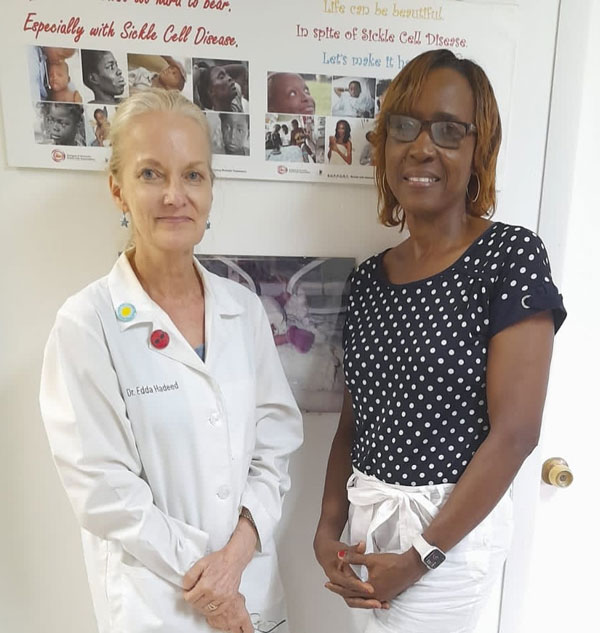
Dr. Edda Hadeed (left) and Ms. Millett
Heatherlyn Millett was in her 30s when a life-altering turn of events changed everything. The unexpected death of her sister, a profound loss, left her with a precious responsibility: raising her ailing infant nephew.
Doctors on the island couldn’t tell her why her nephew was in so much pain so often, or why he was prone to severe infections, leaving Ms. Millett searching for help, frustrated but determined not to give up.
Pain crises and hospital stays on the island went on for years until her nephew was 10 years old and became so ill with lengthy, debilitating symptoms that Ms. Millett found a way, despite limited resources, to take him to see doctors abroad.
“I promised my sister I would take care of her child, and I was going to do everything in my power to help him,” she says today. The boy was finally diagnosed with sickle cell disease and received treatment that is not available locally to manage his complications.
The sudden onset of excruciating pain, when sickle cells block blood flow to organs and limbs, can last for days. Organ damage, infections, vision problems, anemia, and risk of strokes are complications of sickle cell disease. This lifelong disease can be improved with careful management, says Ms. Millett, but the symptoms can be unpredictable and devastating, even if you do everything right.
“In spite of intermittent, harrowing complications, my nephew, who is now in his 20s, is currently pursuing his college degree in health care with great determination. He has plans and dreams for the future.”
“Ms. Millett is a fierce advocate for patients with sickle cell disease, while also a busy, successful general manager of a large local business,” says Dr. Edda Hadeed, president of the Sickle Cell Association of Antigua and Barbuda (SCAAB). “She is an invaluable member of our association and always makes time to help us, whether that’s organizing food drives for our patients or spearheading future projects.”
“Sickle cell disease has more challenges than I can count,” says Ms. Millett. “The disease is pervasive in our local communities, but it’s still misunderstood, under served, and neglected. SCAAB promotes awareness of the disease, provides education to the public and medical professionals, and occasionally has an opportunity to contribute to public policies. Antigua is in dire need of a Sickle Cell Unit with specialized staff, as well as improved medical care on a nationwide level. Getting the help we need is a constant battle, but we are not willing to give up.“


